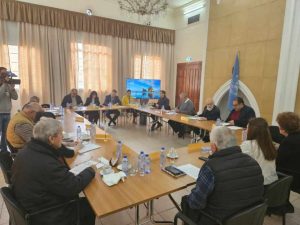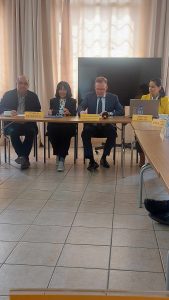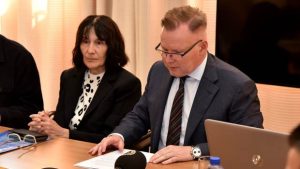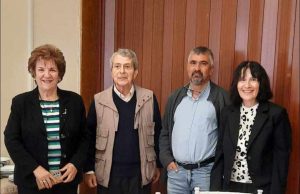30 Μαρ Ledra Palace meeting of the GC and TC political parties, meeting on 27th March 2024, Under the Auspices of the Slovak Embassy in Cyprus




Hosting Party: United Democrats
Topic for Discussion:
‘’Time is of the essence: Two generations of Greek Cypriots and Turkish Cypriots have spent their lives in anticipation and disappointment. Let’s give the prospect of peace, cooperation, development and prosperity to the younger generations of Cypriots, before it’s too late. Let’s make geography work in our own favour’’.
Today, Cypriots, both Greek Cypriots and Turkish Cypriots, find themselves in front of yet another opportunity to seek and arrive at a mutually agreed solution to the decades long problem that keeps both our island, as well as its people, divided.
It took 7 years for a new opportunity for dialogue to be created after Crans Montana in 2017 and 20 years after the referenda of 2004. Within these years, developments on the ground led to greater division and it is obvious that the passage of time makes the finding of a mutually agreed solution even more difficult.
Furthermore, the status quo deteriorates on a daily basis and new risks arise every day that we remain in the absence of a mutually agreed solution. We need not look further than Gaza to realise what the additional risks are and in this regard we re-iterate with concern the statement made several times by President Christodoulides that there are no frozen conflicts.
We remind ourselves that the first generation of refugees -from both communities- is almost all gone, while the second generation, which is mostly people my age, is also growing old. The third and fourth generations now around have no personal memories of how things used to be before 1974 and/or before 1963. These younger generations form their opinions on the basis of what they hear at home, in schools and from Mass Media and the narrative they hear in one community differs from what is heard in the other, in a way that is not conducive to the reproachment of the two communities.
United Democrats are firmly convinced that we, the Cypriots, must utilise the current opportunity for the recommencement of dialogue with a determination and courage to succeed. It is the last opportunity that we have to try and find a mutually agreed solution on the basis of the framework of a Bizonal Bicommunal Federation with political equality, as defined by relevant UN resolutions. If the current opportunity is missed or destroyed, we are very much afraid that any proposed solutions that will follow will be solutions to divide rather than to unify the island, for the simple reason that with time, people -and especially younger generations – get accustomed to the status quo and consider this as normality.
In the public discussion that takes place with reference to a possible solution of the Cyprus problem, what dominates is the content of the governance model of a possible solution and whether any proposed framework protects or undermines the statehood of entities, as envisaged by each community.
The man or woman in the street are not allowed instead to dwell on the implications of any proposed framework of solution on their own daily life in terms of prosperity, economic growth, employment or inflation, including lower prices for energy through the use of our own Cypriot natural gas.
The man or woman in the street are neither allowed to contemplate how unsolicited immigration may be better controlled in a united country,
The man or woman in the street are not allowed to contemplate that the many incidents of corruption that we witness every day on both sides of the green line may actually come under firmer control in a revamped country.
And, ultimately, the man or woman in the street are not allowed to realise how more secure their families will be in a country where sustainable peace has been achieved, rather than in conditions of a status quo that may turn into another Gaza from one day to the next.
Not to mention the daily violation of basic human rights that takes place since at least 1974, with refugees from both communities having been forced to spend their whole lives away from their homes and property, many of them living in conditions of poverty and hardship.
Between 2008 and 2010, three lady economists, a TC, a GC and a British produced a trilogy of economic studies indicating that the peaceful reunification of Cyprus would bring up to 3 additional percentage points of annual economic growth to the whole country and that the reunification of Cyprus would also bring economic benefits to both Turkey and Greece.
At the time, we became the subject of mockery and we were also accused of trying to buy people out into accepting the reunification of their country. In the years that followed, it became a fashion to conduct economic studies on the reunification of Cyprus, to the extent that relevant studies were also done by the IMF and other international organisations. Yet, such discussion, i.e., on the economic benefits of a solution with reference to the average Cypriot woman or Cypriot man in the street has not been encouraged by political leaderships. Even worse, in 2004 there was concerted fear mongering -of which I was personally a witness- that reunification would be costly and that civil servants would lose their jobs if a federal government was to be formed.
I have to note here that it is to the credit of the Slovak Ambassador of the time, Mrs Anna Turenicova, and of the participating parties of this forum of GC and TC political parties that an open event was organised here at Ledra Palace, so that the results of the studies of the three ladies on the economic benefits of reunification were presented to a wider public.
Of course, the solution of the Cyprus problem should also be about human rights; and United Democrats as members of the European Liberal Democrat family know this very well.
So, the pertinent question today remains:
-Where are the human rights of the first generation of refugees, who are now buried under ground?, of all those who have spent their lives awaiting in vain to return to their homes?
-Where are the human rights of the second generation of refugees, now more or less my age, who have spent the most productive part of their lives again awaiting in vain to regain control of their properties and at the same time have struggled financially to raise and sustain their families in adverse, unfair and unequal conditions?
-Where are the human rights of all of us whether refugees or not who have been deprived of living in a normal country since the events of 1963 and 1974.
-Who has measured the foregone development, be it economic development, social development, development of the rule of law and the prevention of corruption, or environmental sustainability, that this country and its people have lost through the decades because of the absence of a solution peacefully unifying the country?
This last question -of foregone development because of lack of peace- seems to have resonated well however with the leaderships of both Greece and Turkey who are now in a process of dialogue to find ways of peacefully cooperating and strengthening their economic relations.
United Democrats are firmly convinced that peace in Cyprus can only be sustainable if the island unifies into a single federal country showing respect to both its communities, as is provided by the framework of a Bizonal Bicommunal Federation with political equality, as described by relevant UN resolutions.
Especially given the undeniable fact that the island of Cyprus is just a dot on the map and that we live in a geographical area which has been full of turbulence throughout the centuries. And, since the landscape of Geography is not something that we can change,
We can however decide to make Geography work in our own favour: by reaching a mutually agreed solution reunifying our island, an agreement which will be beneficial to both communities in Cyprus, and which will also allow peaceful win-win cooperation post a solution between Federal Cyprus and Turkey and Greece, possibly also through the common membership of all three countries in the European Union.
So that we save the lives of the current generations of young Cypriots whom we may send to their death, as we did in 1974 with my generation, if we are not careful and allow Cyprus to disintegrate into warfare again and become another Gaza in the area. And though I have not voted for President Christodoulides, I note solemnly his repeated words of caution that no frozen conflicts exist.
If both communities in Cyprus, as well as our neighbours in the Eastern Mediterranean take serious note of the geography of our neighbourhood, then all should become aware that only through peaceful cooperation can win-win results become available for all, be it in geopolitical terms, in economic terms -including energy- or social and environmental sustainability.
The alternative will be a destruction of all in the medium term.
I hope that we all rise to the responsibility that the times call for, that we stop counting votes and that we try instead to see how we can ensure a sustainable future to all the Cypriots through the utilisation of the current narrow window of opportunity. Otherwise, we risk having no votes to count after that.
Praxoula Antoniadou Kyriacou
Leader United Democrats



